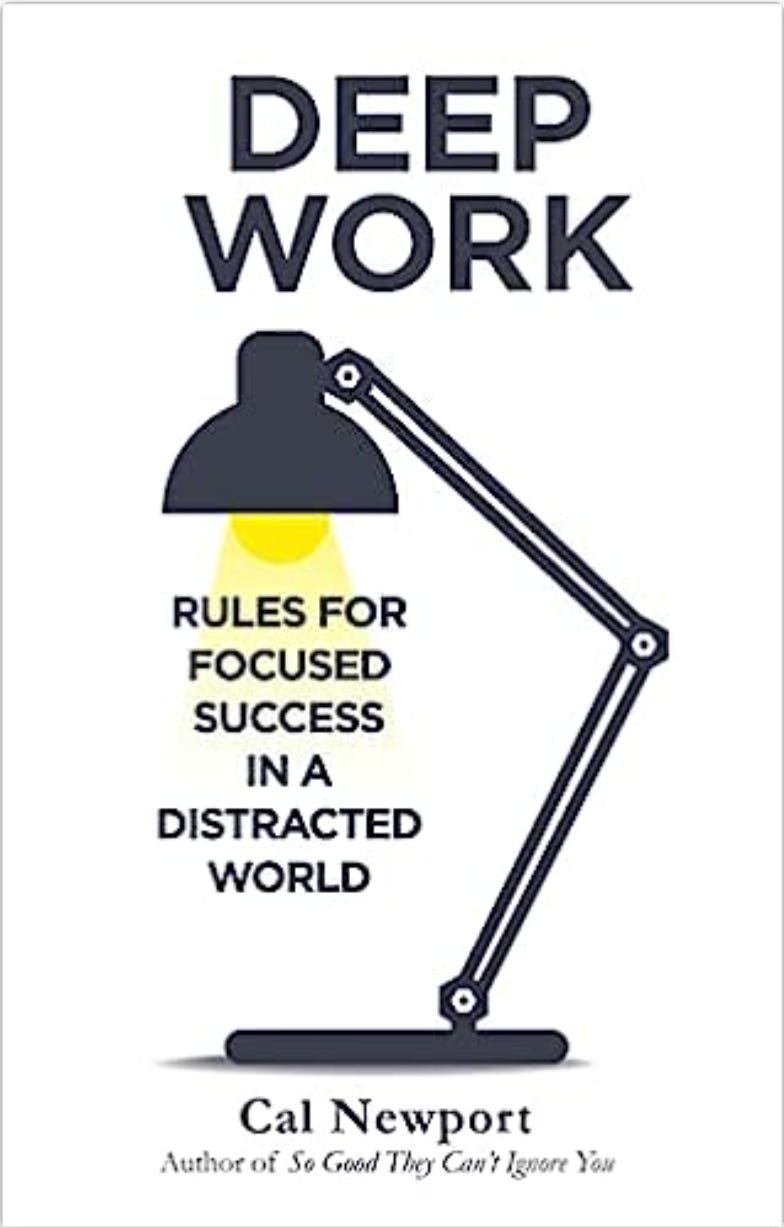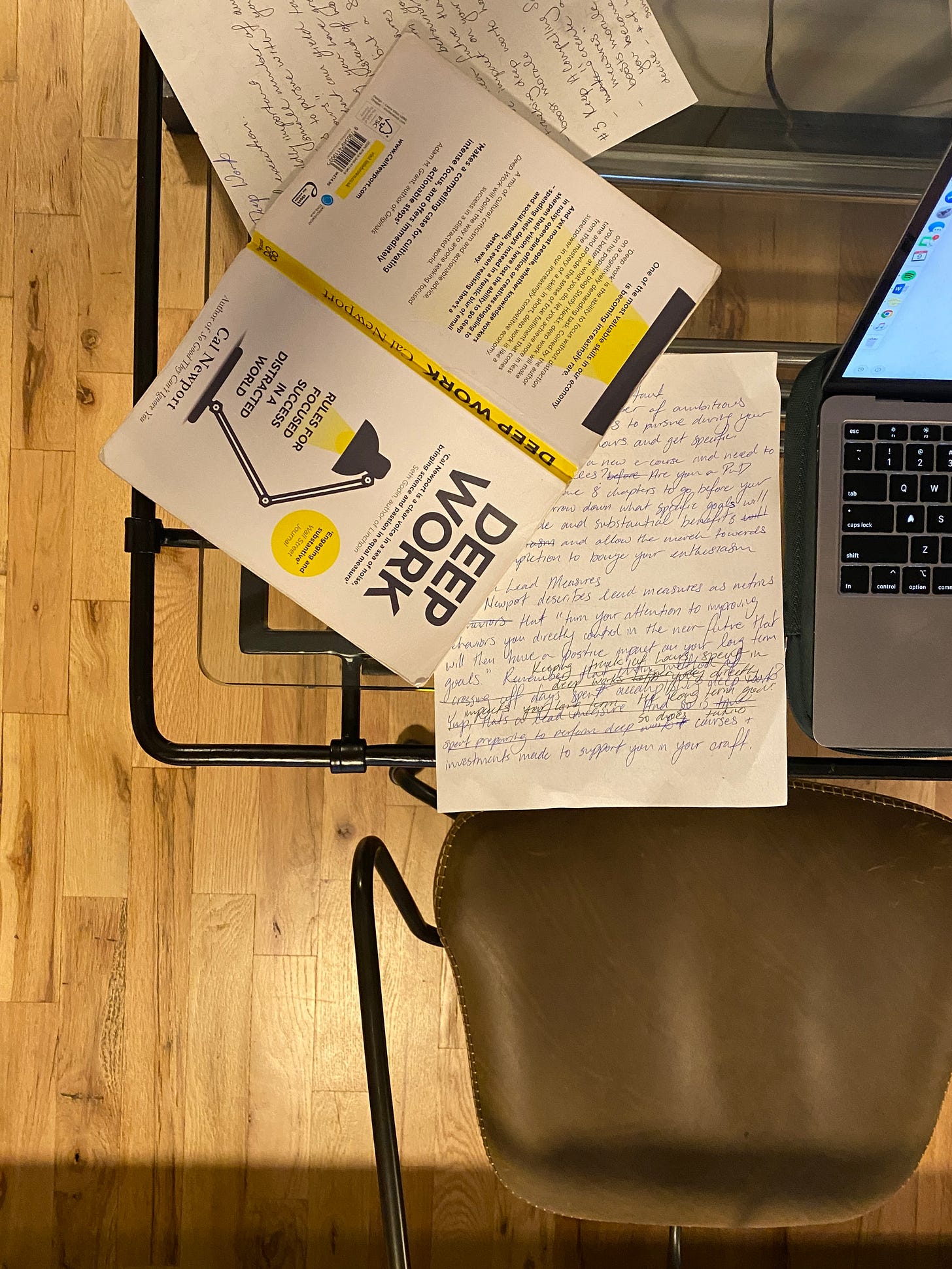Hey, hey!
Greetings from glorious New York City. I am on day three of a two-week break from work, and I am relishing every single moment. On Saturday, I had dinner with family, and Sunday, I’ve mostly been indoors putting the finishing touches on this piece so it can land in your inbox on Monday. Once completed, I hope to go to Van Leeuwen for a cone. I love ice cream shops year-round, but on a day like today, where it is especially muggy, ice cream just hits the spot. Frozen confections aside, this break will also include some local travels to Maine, celebrating my anniversary on the 14th (!), and time spent with friends. My social battery needs to be recharged, and there’s no place better to do it than home sweet home.
In other news, I just finished Deep Work by Cal Newport and it’s really reshaped my approach to work and organization of my time.
I've found it so helpful I've decided to share three of the six strategies the author wrote about to support working deeply.
Two things:
1) I selected the following strategies “Four Philosophies of Deep Work Scheduling”, ‘Ritualization” and “Execution” because although the six mentioned in the book all support performing deep work, I believe these I mention provide a great introduction to deep work for the uninitiated.
2) The other three not mentioned have anecdotal grounding, while the steps provided by the listed strategies provide actionable steps to incorporate deep work into your life and schedule immediately.
If you find value in the information shared, please read the book in its entirety as it is highly insightful and substantive.
Let me know if this breakdown was helpful, whether you’ve read the book or if you have a title you think I should add to my “to be read” list next.
Let’s get into it!
So what the heck is deep work anyway?
The author describes it as "professional activities performed in a state of distraction-free concentration that pushes your cognitive capabilities to their limit. These efforts create new value, improve your skill, and are hard to replicate."
In short deep work is a form of mental endurance where compelling performances are accomplished because of its highly focused nature. Due to the strenuousness of the activity, the author highlights it as a superpower of the 21st century, where shallow outputs of the average office worker abound.
Deep work is the key to heightening your skill level and providing unique value to the world.
Four Philosophies of Deep Work Scheduling
To accomplish deep work, you first have to understand what role it will play in your life. Newport outlined four philosophies of deep work scheduling. They are:
Monastic - a lifestyle of depth that radically minimizes shallowness altogether. Example: No email, very little to no use of social media, and low prioritization for anything that doesn't directly support the day-to-day efforts toward a highly defined goal.
Bimodal - A deep work schedule where your time is divided between clearly defined blocks of deep work, and the rest of the time open to everything else. During deep work sessions, the bimodal philosopher employs a monastic approach of intense, uninterrupted concentration. Example: Using a three-day weekend to hunker down and work while you're off the remainder of the week. Or a professor who loads all teaching coursework into one semester so that they can focus purely on research the other semester.
Rhythmic - This philosophy makes doing hard things consistently accessible because it transforms deep work scheduling into a habit. Also known as the chain method, you place an X through each day on the calendar you perform. Once begun, your job is not to break the chain. Example: You decide to spend 3 hours working towards your goal each day. At the end of the session, you mark your calendar to show completion. This is the most common philosophy for deep workers with routine office jobs.
Journalistic - This philosophy is not for novices as it requires high confidence in one's abilities and can strain willpower. A journalistic approach to deep work scheduling is a practice of switching from shallow to deep work mode at a moment's notice. Example: Named for the deadline-driven nature of journalism, an individual might switch to deep work mode during random unscheduled moments of free time.
If you’re like me, only the rhythmic philosophy is feasible during this season of life.
This is how you make it a ritual.
Ritualize
Many people think that creativity is one of those things that can only be acted on once inspiration hits. However, Newport shatters this thinking by stating deep workers utilize rituals to "minimize friction in their transition into depth, allowing them to go deeper more easily and stay in the state longer." In short, creative outputs result from training the concentration muscle and less waiting for the perfect moment to strike.
Creating effective rituals must address these three points.
Where you'll work and for how long
Think about a location available for long periods without distraction or interruption. The more consistent you are with solely using that space for deep work, the easier it will be for your brain to transition into go mode once on location. Additionally, having a clearly defined endpoint in mind from the beginning reduces the friction accompanying open-ended work.
How you'll work when you start to work
Having a process for how you will work makes slipping into focused efforts easier. Will you have outlines prepared before you start so all you have to do is write? Will you have a word-per-minute metric so you have a reference of what your output should be by the end of the session? The more specific you become, the less time you spend on what you should or should not be doing during your deep work block.
How you'll support your work
Whether taking a brief walk to clear your mind or lighting a candle, having a consistent sensory cue that precedes deep work will make the time more impactful. Some people sip their coffee to turn their brains on. What will be your signal to yourself?
Now that you know your style of deep work scheduling and how to ritualize your performance, here's how to execute.
Execute
While the subject matter will differ across each of our deep work sessions, the ability to use the time block to its peak effectiveness can be accomplished no matter the focus.
Here's how to do it.
Focus on the Wildly Important
Select a small number of ambitious outcomes to pursue during your deep work hours and get specific. Are you launching a new e-course and have six modules to go until completion? Are you a Ph.D. student who must finish eight chapters before committee review? Narrow down what specific goals will return tangible, substantial benefits and allow the march toward their completion to buoy your enthusiasm.
Act on Lead Measures
Newport describes lead measures as metrics that "turn your attention to improving behaviors you directly control in the near future that will then have a positive impact on your long-term goals." Keeping track of hours spent in deep work daily directly impacts your long-term goal by bringing the end goal closer. So does making investments such as taking workshops and educational courses to support your craft.
Keep a Compelling Score Board
To accomplish wildly important goals, having a public place to keep score of progress is crucial to overall success. Newton notes, "Once (you) notice success with a lead measure, (you) become invested in perpetuating this performance." In the case of the rhythmic philosophy of deep work scheduling, hanging your calendar somewhere conspicuous helps accomplish two things 1) it establishes an explicit connection between time spent and work accomplished, and 2) it manages expectations for how long it takes to reach benchmarks as you have a metric of how many deep work hours it took to accomplish the goal
Create a Cadence of Accountability
There's a reason people usually have a gym buddy. We are more likely to accomplish goals if we know people are looking towards us to meet our wildly important goal. Accountability can look like a weekly meet-up or call where "members must confront their scorecard, commit to specific actions to help improve the score before the next meeting, and describe what happened with the commitments they made at the last meeting." The knowledge that others are looking to you to perform is a powerful driving force. Use it to your benefit.
Will implementing a deep work schedule help you in this season of life? What’s a wildly important goal you’ve set for yourself? I’d love to know how I can help support you. Leave me a comment below.
Love ya,
R.








This post finds me at a right time. I’m trying to work myself to jump into something new but really need to work through all the distractions and most importantly my own enemy- me!